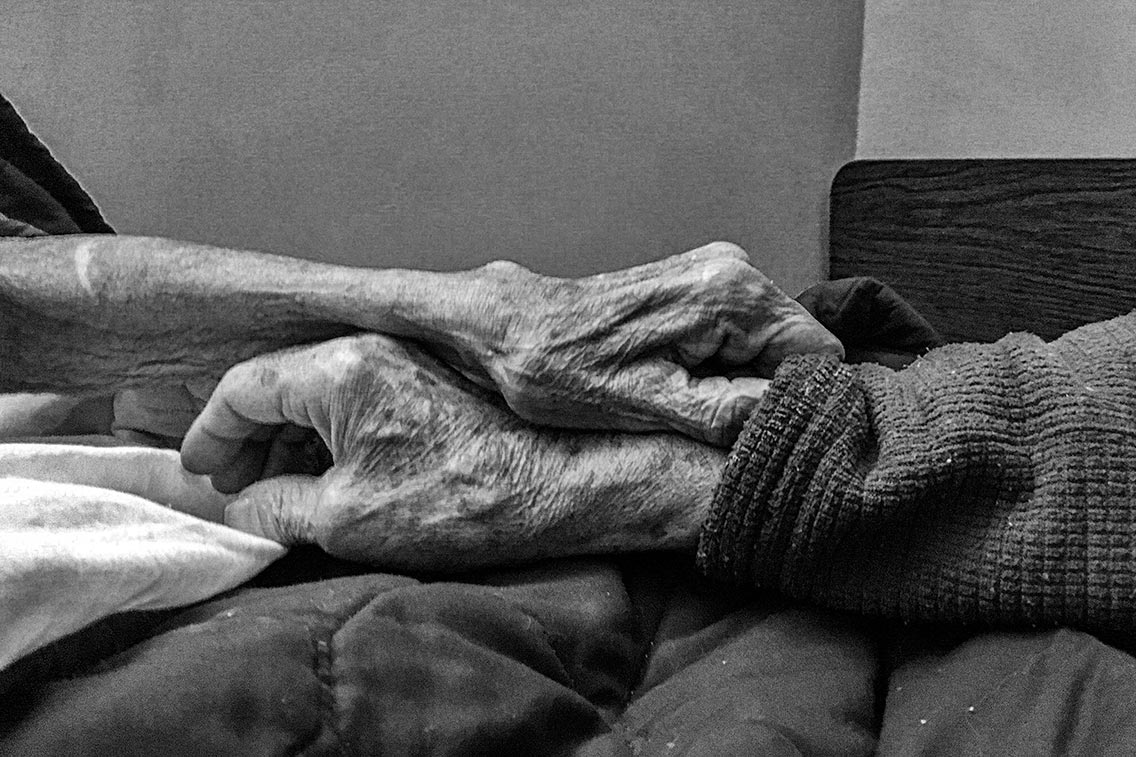DECEMBER 16, 2019. ST. PAUL, MINNESOTA:
Maurie Jo is 11 years older than I am. We have the same father, different mothers. Our father was charismatic, handsome, and a war hero. He cut a dashing figure in Bismark, North Dakota. He also liked to drink, and in the privacy of home, he was not always such a kind or generous man. His wives – he was married twice – did not wear sunglasses to be stylish.
His first wife left him when it got too bad, and then he left North Dakota, moved to Libya, met and married my mother, fathered two more children, and died when I was three.
We would visit North Dakota and see my brother Michael and sister Maurie Jo every summer, but our father’s death tore the family apart.
I never saw Maurie Jo again until yesterday. The marks our father left were huge, and nearly 60 years later we are all still haunted by him. He’s been at the center of my fears for as long as I can remember.
These pictures were taken in the hospice facility in St. Paul Minnesota. Maurie Jo is dying. She is 70 now. Her 71st birthday is in February, and it is extremely unlikely she’ll make it to 71. It’s unlikely that she’ll last until Christmas, and so I am here in St. Paul Minnesota to meet my family again, after all these years, and to say goodbye to my older sister. It’s doubtful she knows who I am. Alzheimer’s has taken what remained of her after a hard, hard life that has included 44 years on methadone maintenance and a long list of abusive partners including an ex husband who served prison time for murder. She served some prison time herself.
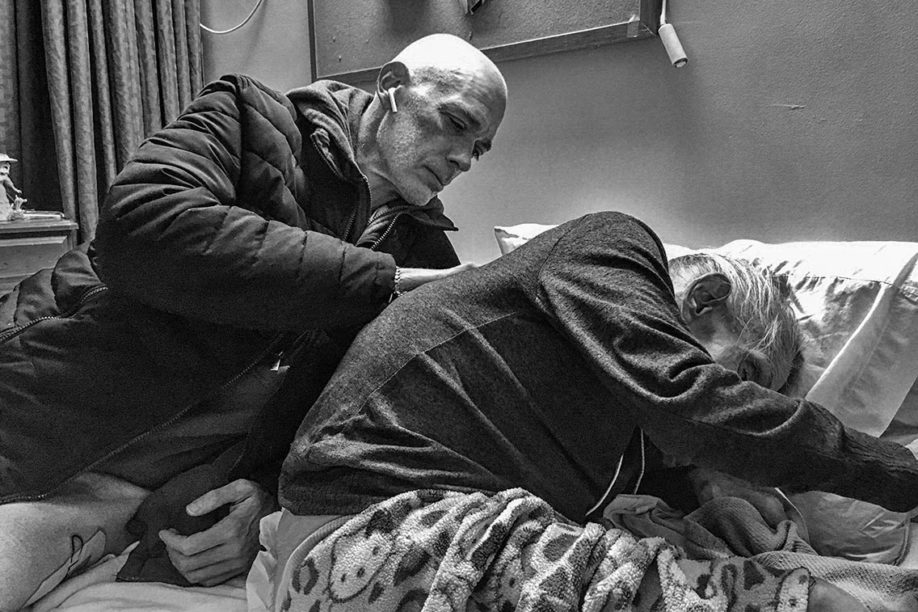
My partner is Mexican American. She tells me Mexicans believe in ghosts. She refers me to Juan Rulfo’s Pedro Paramo. Her grandfather went to seminary with Rulfo, and wrote the introduction to one of his books. I can read all the Juan Rulfo there is (there’s not much) and never really understand it, but I know this: Maurie Jo’s story is full of ghosts. Our entire family is a ghost story.
Americans believe in ghosts as malevolent spirits that need to be banished. Ghosts come out at Halloween and in horror movies. They are not something white people want to deal with, just as we don’t want to deal with the dying, or with death itself. It scares us, so we avoid it.
“Your pictures rob her of dignity,” someone white says, because to them there is no dignity in aging, and especially not in dying. To me, dignity is nearly all Maurie Jo has left.
While looking at her profile, her long elegant nose, the thick grey hair parted on the side, the cheekbones and the jaw, I was reminded of a photo I saw of an elderly Georgia O’Keefe. Michael and I looked at O’Keefe photos online. He agreed.
“Americans associate privacy with dignity,” my partner says.
The only way I feel like I can see what is happening clearly is to use a lens I am unfamiliar with. I imagine myself wearing Mexican glasses because WASP culture doesn’t have the optical tools for this. I listen to my partner and try to see things the way she does.
Listen to how us white folks speak. “Maureen has passed,” people will say. No one will be comfortable with the word dead.
I have had my own discomfort with the idea of death. Maybe discomfort isn’t the right word. Maybe it’s better described as an existential panic on low simmer. This was especially true in the last few years of my Hepatitis C, a time during which a constant conviction nagged. I sensed that time was close to running out and while the likelihood of me dying at that specific moment seemed slim, I wondered if I should just kill myself then and there, before age and sickness took me. That thought was a constant, a hum in the background, sort of like a refrigerator, something that you don’t really hear unless you stop and listen for it, and then there it is, surprisingly loud and clear.
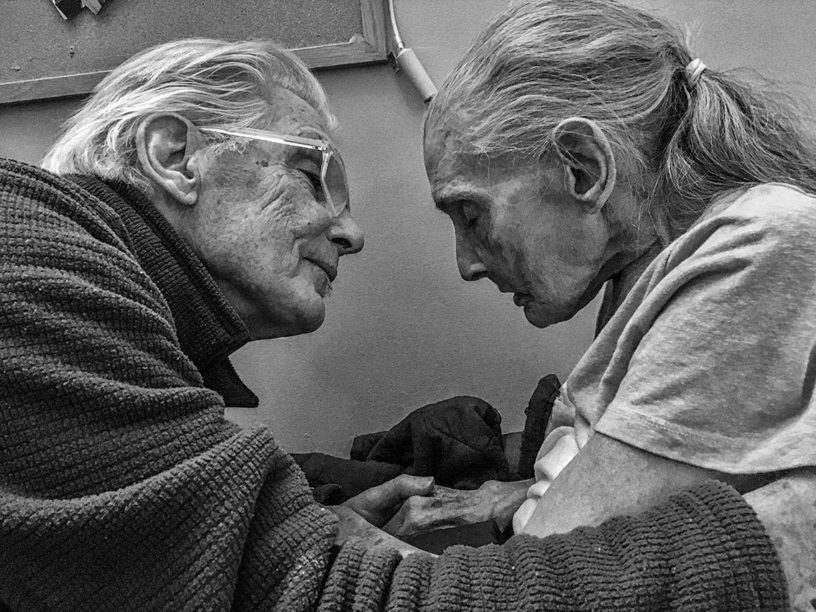
Our handsome, charismatic father beat both of his wives – Maurie Jo’s and Michael’s mother, and mine.
Almost every romantic partner Maurie Jo ever had abused her.
Of her exes Michael says, “There wasn’t one who didn’t beat her, stab her, or shoot her.”
According to RAINN, one in three women in America will experience domestic violence, and one in four will be raped or sexually assaulted. In my family, the statistics are higher. Every single one of them has been sexually assaulted, and the only one who has not been the victim of domestic violence has never been in a romantic relationship with a man.
It’s not just a handful of men running amok abusing and raping women the world over. In my family, four women were abused by at least fourteen men. It’s everywhere. Rape and violence against women are as American as every analogous cliche. Such harm is common.
****
I hadn’t seen Michael since our father died when I was about 3 and he was about 13. We’ve traded messages over the years, but only recently with any frequency.
Dark secrets have always dogged our family and our father always seemed to be at the center of them. I’ve been dealing with his ghost my entire life. He was a handsome, charismatic war hero. Not as many people knew of his habit of brutalizing his wives, and if they did, no one discussed it.
That’s dirty laundry stuff. Personal. Nobody’s business outside of the family. This and male solidarity are why so many women still suffer abuse. Many good people find woman battering distasteful, and so, they look the other way. Many good people oppose woman-battering. It seems, however, that among these good people, few, if any, are prepared to stop gendered violence.
****
My father has not been a Mexican ghost. He doesn’t move about the house at night making his presence known. He is not there to be personally interacted with. Haunting is a psychological phenomenon that often provides a context for social problem solving. A person faced with a social problem is given intellectual tools by the psychological phenomenon of a haunting, enabling them to parse out elements of the problem and locate the solution internally. This is particularly the case in the context of the haunted house. A Mexican haunted house, that is, because white ghosts are like white people: they are distant. They don’t get involved. They pass, and ascend directly to heaven. Blond Jesus greets them at the gates.
My father’s ghost just sort of loomed from afar. He manifested himself just about everywhere. People knew him and talked about him. I was always being compared to him and falling short.
He haunted Maurie Jo, too. She never recovered. All these years after his ghost inserts itself into my conversations with Michael.
A desire for control inspires abuse. In that way, patriarchy is totalitarian and in the fifty-seven years since his death, my father continues to exercise control over his four adult children.
****
Preston is my nephew, Maurie’s only child. His father is Gerry. Maurie Jo was a pregnant teenager when they married. Preston is in his 50’s now, struggling with addiction, like his mother and her two brothers did. I’ve been sober for 23 years and Michael about the same. It never took with Maurie Jo, which is why she was on methadone until the day she died.
Preston says, “You travel a lot. Mom never traveled. If you take some of her ashes maybe she can finally travel with you.”
“She never saw the mountains,” Michael says. “She never saw the ocean”.
After moving to Minnesota from North Dakota, my sister only left the state twice. Once was for a trip to New York on a check kiting spree orchestrated by some Minnesotan gangsters. The other was to the Federal Penitentiary in Leavenworth as a result of that trip to New York.
And Preston’s dad Gerry? He was a drugstore cowboy, a junkie and a hapless criminal whose life of crime would be comical if it didn’t include a murder. Gerry found sobriety in prison. He also found God. He was released a few years ago, and died soon after.
Yes, Maurie Jo can travel with me. My partner and I will take her to Mexico. She should go somewhere warm.
****
My first night in St. Paul Minnesota, staying at a Days Inn that advertises itself as a gun-free zone, I took a walk to get some food. There was a Denny’s about half a mile down the road. My server was a guy named Jeff. He had a rat-tail. I haven’t seen one of those since about 1980, when I had one.
At the booth next to me were a youngish couple. I’m not sure how long they’ve been a couple, or what kind of couple they are. My guess is they teamed up earlier in the day. Neither had bathed in a while. They smelled stale. She looked older and street-worn. He talked about the last place he was kicked out of. His story did not interest her.
They were unhoused. They were also pretty low on funds. One of the waitresses at Denny’s covered their meal. I think they were both junkies.
It was about 0 degrees outside, which means it would need to get a lot warmer before it reached freezing. I didn’t think to bring a scarf with me, so my face was exposed to the wind on the walk home. My face went numb. It felt like it was going to fall off.
I think Maurie Jo will like Mexico.
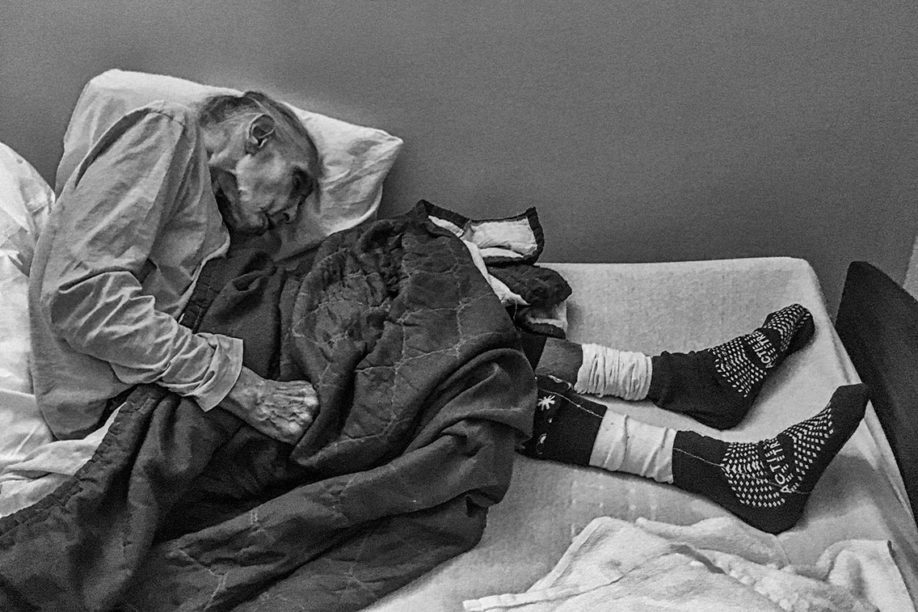
The second floor of the facility was a lockdown floor. I believe it’s called a “memory wing.” It was kept locked down so that people didn’t wander off.
The patients there seemed mostly abandoned. Maurie Jo was the only person who had regular guests. Her roommate, Judith, had moved up to St Paul from Nevada, to be closer to her daughter. Her daughter was supposed to visit the week before, but couldn’t, because one of her kids was sick.
It sounded like it had been a while since Judith’s daughter had visited. Perhaps a year.
Judith hated the facility. She was on the waiting list for a bed at the VA. She’d been on the waiting list for two years. She hoped that a bed would open any day. She hoped that her daughter would visit that weekend. She would moan and call for the nurse throughout the day. The nurses were busy and knew that what Judith wanted was attention. The facility was understaffed, and the staff was likely underpaid.
Jesus was one of the younger patients, maybe in his 50s. He could walk. Maybe at one point Jesus spoke English, but he only spoke Spanish now. He had a pad of paper and crayons and drew pictures of nouns and used those pictures to try to teach the staff Spanish.
Everybody loved Jesus.
Everybody loved Maurie Jo, too, because she never asked for anything. By that point, she couldn’t. She could no longer communicate. When she arrived, Maureen could still talk. The Alzheimer’s had robbed her of the ability to remember much of anything, but she still maintained her independence, as much independence as you can maintain when you can’t remember anything and wear diapers.
She called all the women Missy.
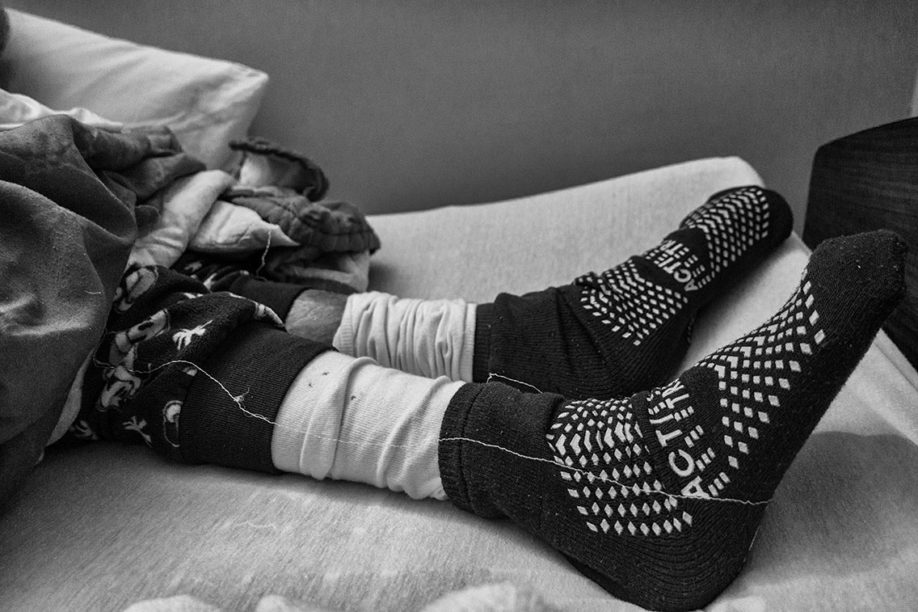
When I arrived Maurie Jo hadn’t eaten in a week.
Every day she seemed more frail, even though her frailty the day before had seemed impossible.
A hospice worker came by for music therapy. She played guitar and sang some gentle folk songs. Maurie Jo seemed to have withdrawn into a place deep, deep inside herself. Still, it seems the music calmed her, or perhaps her weakness did. The mild agitation of the days before had disappeared.
Michael was going to stop by before work, and then leave work early to drive me to the airport. Instead, he decided to stay.
A minister came by. He talked to Maurie Jo, and prayed over her. His intention was to pray with her, but Maureen was not capable of praying with anyone. He asked us what we knew of her spiritual beliefs.
The minister knew his 12-step stuff and seemed to focus on prayers found in the Big Book of AA. These prayers are familiar to me as a sober person, and to Michael, but Maurie never found sobriety, although I’m told she tried a few times.
Her breathing had grown so shallow it would disappear altogether. Michael and the minister and I would pause, holding our own breath, watching carefully to make sure she was still alive. Her breath would flutter after thirty seconds or so. She’d do a little gasp and then settle back into shallow breathing. We would feel oddly relieved that she was still “with us” even though that last breath could come at any moment.
The last breath came two days later, early in the morning of December 21.

